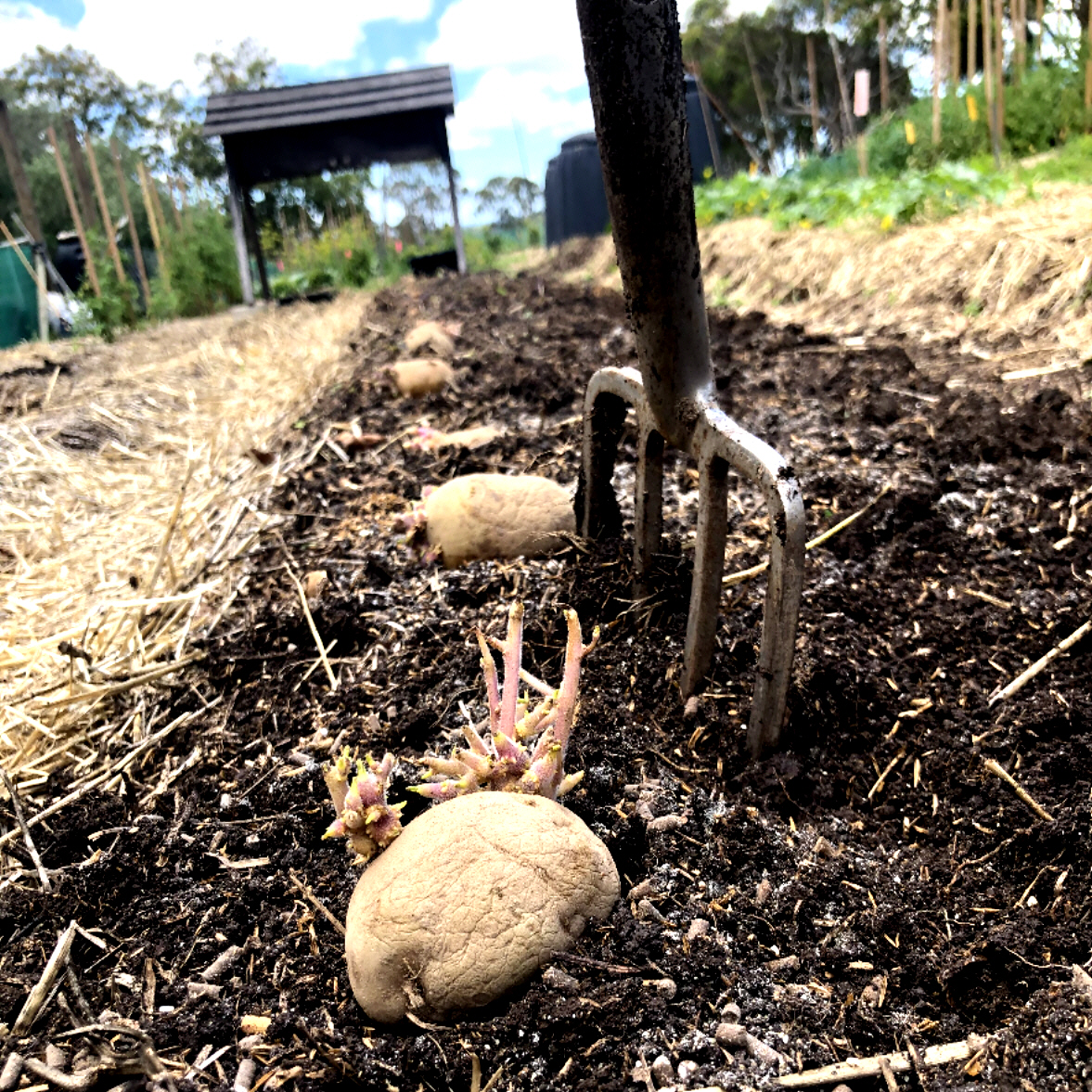
Growing up as a child in Queensland, I remember there only being one or two varieties of potatoes in the supermarket to choose from. Today, potatoes are typically grouped into 3 categories; either starchy, waxy or all-purpose. While this is a great help in the kitchen, it is not much help in the garden. I've since learnt one huge big thing that not many home gardeners are aware of!!!
Someone recently mentioned to me that they were talking to a commercial potato farmer and he said that he doesn't hill his potatoes. I instantly thought to myself (and may have even mentioned it in my ignorance) 'that's not very clever!' :0l
My line of thinking at the time was based on the idea that you are meant to hill the soil up around the potato stems to both stop the plant from falling over and also to increase yield ie. wherever the plants stem touches the soil it will send forth roots (or tubers / potatoes)! Simple right?
I have since learnt that just like tomatoes, there are both determinate (bush with short stems) and indeterminate (bush with long stems) types of potatoes, and it actually makes a HUGE difference.
DETERMINATE POTATOES (Bush types with short stems)
DETERMINATE potatoes will only produce tubers in a single layer. For this reason they do not need the mounding up of the soil around them. They also produce earlier in around 70 to 90 days so great for growing in cooler areas with short growing seasons. Determinate varieties are also a great choice for a no-dig garden bed as the tubers simply need to be placed on top of the soil and covered with plenty of straw and well rotted manure, or planted as normal around 10cm deep and mulched lightly - no hilling up as they grow!
VARIETIES include: Kipfler, Pink Eye, Purple Congo, Banana, Carlingford, Kennebec
INDETERMINATE POTATOES (Tall types with long stems)
INDETERMINATE potatoes will produce tubers in multiple layers along the stem. For this reason they require mounding up of the soil around the stem as the plant grows. They also produce later in around 110 to 135 days but will give a much higher yield (ie. more tubers!!!). They are a great choice for 'bag' growing or in tyres where you simply keep adding plenty of straw and composted manure as the plant grows up until just the tip of the stem is above the mulch.
VARIETIES include: Nicola, Dutch Cream, Pink Fir Apple, King Edward, Brownell, Sebago, Pontica, Sapphire
Combined with knowledge of how the potatoes cook and your preferences for eating them, your guaranteed success in both the kitchen and the garden! :0)
_______________________________________________________________________________________
STARCHY POTATOES
Starchy potatoes are high in starch, low in moisture and have a floury texture with creamy white flesh. Starchy potatoes release a milky, starchy liquid if pricked or cut. They also tend to be long and have a coarser skin.
GOOD FOR:
Starchy potatoes are fluffy and absorbent which makes them great for baking and frying so use them to make crispy potatoes, hot chips, wedges, mashed potato cakes or hash browns. They can also be mashed but are susceptible to becoming stodgy when overworked.
NOT GREAT FOR:
Because of their high starch content, starchy potatoes don’t hold together very well when cooked so avoid using them in dishes that require boiling, roasting or slicing like casseroles, potato bakes, gratins or potato salads.
VARIETIES include: King Edward
WAXY POTATOES
Waxy potatoes have less starch than starchy potatoes and contain more moisture and sugar. They are often smaller with a waxy outer skin and a creamy, firm and moist flesh.
GOOD FOR: Waxy potatoes hold their shape well after cooking so are great for boiling, roasting or slicing. Use them to cook casseroles, soups or potato salads.
NOT GREAT FOR: Waxy potatoes are not good for mashing because they hold their form and produce a chunky mash. They are also avoided for baking and deep frying.
VARIETIES include: Dutch Cream, Kipfler, Nicola, Pink Eye, Pink Fir Apple, Purple Congo, Carlingford
ALL-PURPOSE POTATOES
All-purpose potatoes have a medium starch content that fall somewhere in between starchy and waxy potatoes. They have more moisture that starchy potatoes and hold together in boiling water.
GOOD FOR: All purpose potatoes are particularly useful for roasting, pan frying, stewing and are good in soups or gratins
NOT GREAT FOR: They can be baked, mashed, or deep fried like a starchy potato, but will not produce the same fluffy texture. You can use all-purpose potatoes for just about anything but if you have a specific dish in mind that lends itself to a starchy or waxy potato, then opt for those types instead.
VARIETIES include: Coliban, Desiree, Pontiac, Sebago, Spunta, Kennebec
